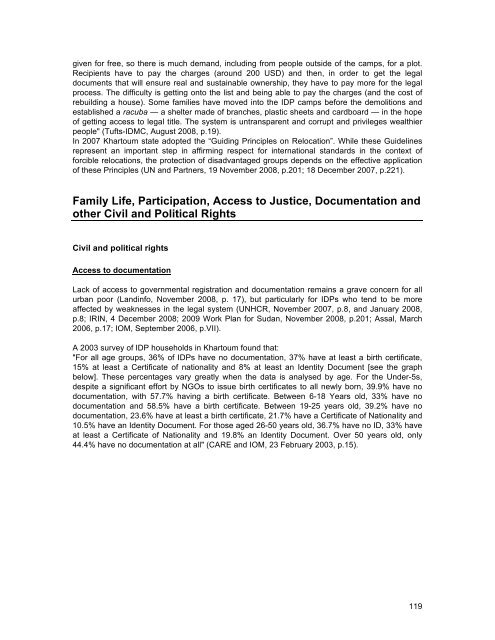SUDAN: Durable solutions elusive as southern IDPs return and ...
SUDAN: Durable solutions elusive as southern IDPs return and ...
SUDAN: Durable solutions elusive as southern IDPs return and ...
Create successful ePaper yourself
Turn your PDF publications into a flip-book with our unique Google optimized e-Paper software.
given for free, so there is much dem<strong>and</strong>, including from people outside of the camps, for a plot.<br />
Recipients have to pay the charges (around 200 USD) <strong>and</strong> then, in order to get the legal<br />
documents that will ensure real <strong>and</strong> sustainable ownership, they have to pay more for the legal<br />
process. The difficulty is getting onto the list <strong>and</strong> being able to pay the charges (<strong>and</strong> the cost of<br />
rebuilding a house). Some families have moved into the IDP camps before the demolitions <strong>and</strong><br />
established a racuba — a shelter made of branches, pl<strong>as</strong>tic sheets <strong>and</strong> cardboard — in the hope<br />
of getting access to legal title. The system is untransparent <strong>and</strong> corrupt <strong>and</strong> privileges wealthier<br />
people" (Tufts-IDMC, August 2008, p.19).<br />
In 2007 Khartoum state adopted the “Guiding Principles on Relocation”. While these Guidelines<br />
represent an important step in affirming respect for international st<strong>and</strong>ards in the context of<br />
forcible relocations, the protection of disadvantaged groups depends on the effective application<br />
of these Principles (UN <strong>and</strong> Partners, 19 November 2008, p.201; 18 December 2007, p.221).<br />
Family Life, Participation, Access to Justice, Documentation <strong>and</strong><br />
other Civil <strong>and</strong> Political Rights<br />
Civil <strong>and</strong> political rights<br />
Access to documentation<br />
Lack of access to governmental registration <strong>and</strong> documentation remains a grave concern for all<br />
urban poor (L<strong>and</strong>info, November 2008, p. 17), but particularly for <strong>IDPs</strong> who tend to be more<br />
affected by weaknesses in the legal system (UNHCR, November 2007, p.8, <strong>and</strong> January 2008,<br />
p.8; IRIN, 4 December 2008; 2009 Work Plan for Sudan, November 2008, p.201; Assal, March<br />
2006, p.17; IOM, September 2006, p.VII).<br />
A 2003 survey of IDP households in Khartoum found that:<br />
"For all age groups, 36% of <strong>IDPs</strong> have no documentation, 37% have at le<strong>as</strong>t a birth certificate,<br />
15% at le<strong>as</strong>t a Certificate of nationality <strong>and</strong> 8% at le<strong>as</strong>t an Identity Document [see the graph<br />
below]. These percentages vary greatly when the data is analysed by age. For the Under-5s,<br />
despite a significant effort by NGOs to issue birth certificates to all newly born, 39.9% have no<br />
documentation, with 57.7% having a birth certificate. Between 6-18 Years old, 33% have no<br />
documentation <strong>and</strong> 58.5% have a birth certificate. Between 19-25 years old, 39.2% have no<br />
documentation, 23.6% have at le<strong>as</strong>t a birth certificate, 21.7% have a Certificate of Nationality <strong>and</strong><br />
10.5% have an Identity Document. For those aged 26-50 years old, 36.7% have no ID, 33% have<br />
at le<strong>as</strong>t a Certificate of Nationality <strong>and</strong> 19.8% an Identity Document. Over 50 years old, only<br />
44.4% have no documentation at all" (CARE <strong>and</strong> IOM, 23 February 2003, p.15).<br />
119
















